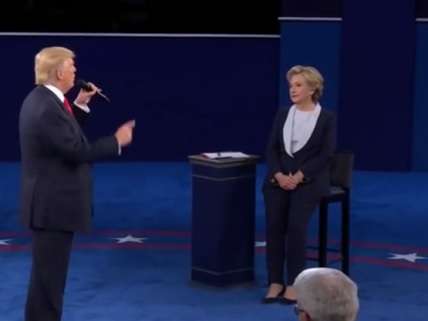Hillary Clinton Outraised Donald Trump Two to One, Last FEC Filings Show
Trump also ended with more money left over.

Hillary Clinton, the Democratic National Committee, and the various political action committees (PACs) supporting her raised $1.2 billion for the 2016 elections, Politico reports based on the last campaign filings with the Federal Election Commission. Donald Trump, the Republicans, and the various PACs supporting him, meanwhile, raised $600 million. The Trump campaign spent nearly $100 million in the final period, remaining with $7.6 million in the bank. The Clinton campaign spent about $132 million and was left with less than a million in the bank.
An analysis of donors by the Washington Post in October found that a hundred individuals and labor unions were responsible for a fifth of all of Clinton's donations—five donors were responsible for one out of every 17 dollars contributed according to the Post: S. Donald Sussman, a hedge fund manager, J.B. Pritzker a venture capitalist and brother of Commerce Secretary Penny Pritzker, and his wife, Univision chairman Haim Saban and his wife, George Soros, and Slimfast founder S. Daniel Abraham.
A few of the donors spoke to the Post, insisting they did not agree with their right to give so much money and wanted it taken away. "It's very odd to be giving millions when your objective is to actually get the money out of politics," Sussman said. "I am a very strong supporter of publicly financed campaigns, and I think the only way to accomplish that is to get someone like Secretary Clinton, who is committed to cleaning up the unfortunate disaster created by the activist court in Citizens United."
Citizens United, of course, was the Supreme Court case centering around a film critical of Clinton that a group called Citizens United wanted to air it during the 2008 Democratic primaries. Setting aside how ridiculous it sounds to believe that someone who is exploiting a system can clean it up (after all, Sussman surely never bought Trump's argument that he could clean up cronyism because he participated in it), the right to engage in campaign-related political speech is actually critical to an environment in which substantive dissent is possible.
The fight to keep "money out of politics," such as it is, often ends up stifling speech critical of incumbents, whose incumbency makes outside money less important to their ability to engage in political speech. Campaign spending, after all, doesn't affect election results much—Trump being outspent in the primary and general election being just the latest examples of that. Yet money can be useful to spread a message, hence the importance of an unfettered right to political speech that acknowledges that the means to engage in and amplify political speech are part of the right itself. No amount of money can make a flawed message appealing, as Jeb Bush and Clinton, among others, learned.
Now that Trump is set to become the 45th president of the United States, perhaps progressives hostile to Citizens United will realize that, like the filibuster and other checks and balances, free political speech plays an important role in curbing the power of government and its ability to act on unilateral agendas without impunity.


Show Comments (94)